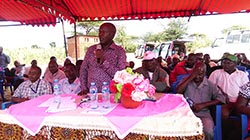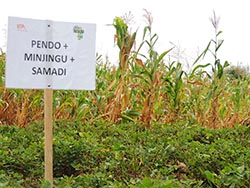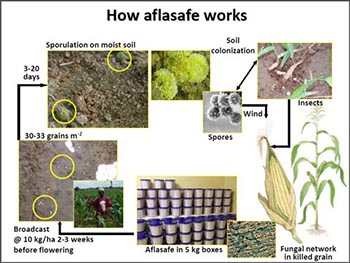Kongwa district has suitable climatic conditions for growing groundnut and is among the top producers in Tanzania. However, production is being threatened by many factors including declining soil fertility, the changing climate, lack of improved varieties and contamination with aflatoxin - a highly poisonous chemical produced by naturally occurring fungus, Aspergillus flavus, found in the soil. Current groundnut yield is estimated at 0.6 t ha-1 against the potential of 2.2 t ha-1.
N2Africa and Aflasafe teams are working in twelve villages of Kongwa District to combine the agronomic technologies with AflasafeTM biological control to promote better groundnut production. In each of the village, the teams have set up trial(s) to demonstrate the use of improved varieties (Pendo and Mmnanje), organic and inorganic fertilizers such as Minjingu fertilizer, Gypsum and their combinations with AflasafeTM. AflasafeTM is a complete safe biological aflatoxin control technology, that contains a mixture of four atoxigenic strains of Aspergillus flavus of Tanzanian origin. The product was developed by IITA in collaboration with the Agriculture Research Service of the U.S. Department of Agriculture (ARS-USDA), amongst others, and it can effectively reduce aflatoxin concentration by more than 70%.
Recently, N2Africa and Aflatoxin teams organized a farmer’s field day in the district, to create further awareness on these technologies among the local communities to promote their adoption that attracted over 500 farmers. Peaking at the event, Anfigwege Mwaipopo, the Acting Kongwa District Executive Officer and guest of honor, said farmers adoption of the technologies would catalyze groundnut production in the area and add its market value. Furthermore, Mwaipopo noted that aflatoxin was of particular concern, as it negatively affected the health of the community and reduced the crop’s market value.
 |
Left: Mr.Anfigwegwe Mwaipopo, a guest of honor, Kongwa District Officer Right: Pendo Minjingu and Farm yard manure peanut technology |
 |
Leon Mrosso, the Central Zone Research Director from ARI-Makutupora, urged farmers to adopt the new technologies demonstrated to increase their groundnut productivity and enhance their income. He also urged farmers to create awareness among other farmers on the technologies they had seen, especially on the application of AflasafeTM. "AflasafeTM can help protect farmers and their families from aflatoxin. All farmers should be made aware of aflatoxin and how to reduce it in their produce, including use of AflasafeTM," Mrosso said. Mwantumu Omari, the Tanzanian Business Development Officer for N2Africa, said the project was working closely with farmers to identify challenges in legume production and finding sustainable solutions through research. N2Africa’s overall aim is to enable African smallholder farmers to benefit from symbiotic N2-fixation by grain legumes through effective production technologies, including inoculants and fertilizers.
|
Reuben Samwel, Research Technician with IITA, explained AlfasafeTM to the farming community. He said the technology was safe and environmental friendly and able to significantly reduce aflatoxin contamination in groundnut and maize at harvest and in storage. He encouraged farmers to use AflasafeTM - once the technology was registered and made available in the country - , alongside other technologies, such as use of fertilizers, to get a safe product. Figure derived from the related link: http://www.aflasafe.com/aflasafe |
 |
The chairman of the village, Mr. Jeremiah Mtua, appreciated the N2Africa efforts and the government in supporting farmers in groundnut production and creating awareness on new improved farming methods. However, he noted one challenge farmers are facing was accessibility of the new improved variety demonstrated.
In Tanzania, the technology is currently being developed in partnership with the biological control unit at the Ministry of Agriculture, Livestock and Fisheries. The experimental AflasafeTM are being tested in selected areas in Dodoma region and Kongwa district on maize, in Mpwapwa and Kongwa on groundnut, in Morogoro region (Kilombero and Kilo) on maize, and in Mtwara (Masasi and Nanyondo) on groundnut.
Catherine Njuguna, IITA, Tanzania
